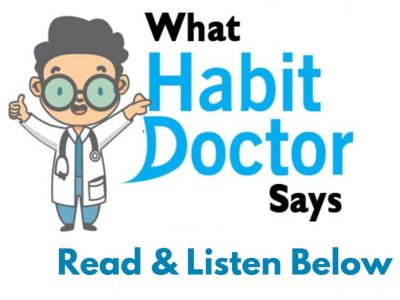After an endless time of mental programming, we automatically slip into patterns of thinking and acting. That is what we call a habit. What you repeatedly do ultimately forms your character. It may be hard to process the fact that you are essentially the sum of your habits. And we rarely notice what it truly is that is running our lives.
Have you ever come across a practice you know is bad for you and you still cannot seem to stop? Many fight with unhealthy excess weight issues that can be easily lost by eating right and exercising more. Drug and alcohol abusers can give up addictions but they cannot and they end up tearing apart friendships and family. And smokers know it will eventually kill them and even though they cannot quit. Why does that happen?
Why are habits so hard to break?
NIH-funded scientists state that bad habits, once established, are very difficult to kick. The brain’s circuits for habit and goal-directed action competes for absolute control in the decision-making area of the brain. There is a science behind how we develop routines. And the key to creating new good habits and breaking the bad ones is to understand some fundamental laws.
- Repetition
A complex network of brain areas controls motor actions and compulsive behaviors. Once you repeat any practice, over time our minds start working on a mental auto-pilot system. The set routine allows you to navigate without having to reinvent the wheel every time. We start to automatically follow that without really thinking about the directions. Our brain makes our behaviors automatic. Doing so gives it the advantage of not having to use conscious thought processes to perform the activity. This frees up the brain’s capacity to focus on different things. It becomes difficult to break the chain of repetition because if a particular action requires more mental or physical effort than you are willing to expend, then chances are you will not do it.
- Rewards
Rewards are the motivational force behind every habit. Routine practices get difficult to break when positive or enjoyable events trigger the brain’s reward centres. That is why gambling is addictive and also compulsive use of electronic gadgets and social media. A potent trigger can spark an intense wave of desire. And your mind is constantly analyzing internal and external environments for hints of where rewards are situated. Because the cue is the first indication stating that you are close to a reward, it naturally lures to a craving. Disrupting hard-wired automatic behaviors is very tough and that is what makes breaking habits so difficult.
- Remains
When you try to replace the bad habits, the first learned habit does not erase the original behavior completely. Both actions remain stuck in your brain. When you force your brain to follow another pattern, the alternative behaviors can counteract the impulses to repeat the original behavior. A habit when it has been there for long leaves a lasting mark on specific circuits in the brain. That is what is priming us to feed our cravings. Training yourself to maintain the behavioral changes can be tough and people tend to give up almost immediately and fall back to the old habits.
The good news, however, is that humans are not simply creatures of habits. The first step is to know what you are doing and then try to undo it. If you know of what affects you negatively, develop strategies to counteract them. Gradually, good practices will become a habit and replace bad ones. If you can learn to control your habits at the problematic tipping point itself, long before they become addictions or disorders, then you will have a much better chance at surviving and thriving. We have more brain regions to help us do what is best for our health. Regularly practising different types of self-control will help you overcome your negative habits.



your advice is like a treasure map in the vast desert of health information. Each post is a clue leading to the riches of well-being